外研版八年级英语上册导学案A层全册-八--N63
外研版八年级英语上册导学案A层全册-八N28
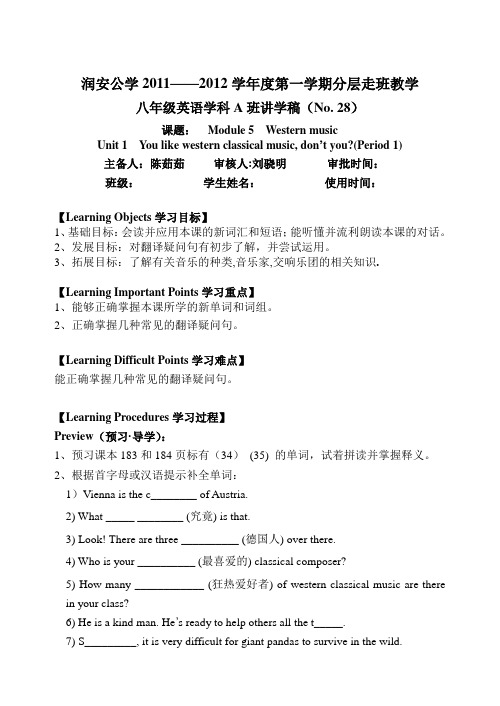
润安公学2011——2012学年度第一学期分层走班教学八年级英语学科A班讲学稿(No. 28)课题:Module 5 Western musicUnit 1 You like western classical music, don’t you?(Period 1)主备人:陈茹茹审核人:刘骁明审批时间:班级:学生姓名:使用时间:【Learning Objects学习目标】1、基础目标:会读并应用本课的新词汇和短语;能听懂并流利朗读本课的对话。
2、发展目标:对翻译疑问句有初步了解,并尝试运用。
3、拓展目标:了解有关音乐的种类,音乐家,交响乐团的相关知识.【Learning Important Points学习重点】1、能够正确掌握本课所学的新单词和词组。
2、正确掌握几种常见的翻译疑问句。
【Learning Difficult Points学习难点】能正确掌握几种常见的翻译疑问句。
【Learning Procedures学习过程】Preview(预习·导学):1、预习课本183和184页标有(34)(35) 的单词,试着拼读并掌握释义。
2、根据首字母或汉语提示补全单词:1)Vienna is the c________ of Austria.2) What _____ ________ (究竟) is that.3) Look! There are three __________ (德国人) over there.4) Who is your __________ (最喜爱的) classical composer?5) How many ____________ (狂热爱好者) of western classical music are there in your class?6) He is a kind man. He’s ready to help others all the t_____.7) S_________, it is very difficult for giant pandas to survive in the wild.8) —Can you sing that piece of music?—Of c__________ I can.【Class Activities 课堂活动】Step 1 Feedback on the preview:讨论解决预习中存在的问题(师生互问探讨)。
外研版八年级上册英语全册导学案版本

外研版八年级上册英语全册导学案版本2外研版初中英语八上全册导学案目录Module 1 How to learn EnglishModule 2 ExperiencesModule 3 Journey to spaceModule 4 EducationModule 5 Western music.docModule 6 A famous storyModule 7 Feelings and impressionsModule 8 Around townModule 9 Animals in dangerModule 10 Lao She''s TeahouseModule 11 The weatherModule 12 Traditional lifeModule 1 Unit 1一、目标导向:表示提建议的句型有:How/What about doing …2、Would you like to do sth…Let’s do sth…Why don’t you do sth…?Why not do st h…?6、You should/shouldn't do sth…7、It's a good idea to do sth二、自主尝试translation1. 为什么你不买些笔记本呢?2. 为什么你不听收音机呢?3. 为什么我们不纠正我们的错误呢?4. 老师应该帮助小朋友们过马路5. 贝蒂帮我学英语。
三、因势利导( Fill in the blanks)1 She shouldgo to school early2 Why don’t youplay basketball3 How about eat noodles?4 There are fivemistake in your homework5 She is going tohelp his father.6 It’s a good idea to get up early7 Heplay football very well8 My mother has sixpen friend.四、及时巩固translation1. Robin doesn’t speak Chinese so I’ll have to ________ 翻译.2. __________ 改正 the mistakes of your homework is very important.3. Can you ______ 重复 your questions?4. Make sure you give ____ 每个 word its right __________发音.5. Can you give me some ______ 建议 about buying a house?6. Who ___ 其他的 was at the party?7. I have two ______ 录音机.8. You’ve got some ________ 极好的 CDs here.9. He works in a province ________ 管弦乐队.10. 为什么你不把你的错的地方写在你的笔记本上呢?__________ you __________ the mistakes in your notebook?11. 把这篇文章翻译成英文怎么样呢?____________________ this writing into English?12. 不要尝试与坏人交朋友。
外语教学与研究出版社初中英语八年级上册全册教学设计教案

外语教学与研究出版社初中英语八年级上册全册教学设计教案教学设计目标- 帮助学生掌握八年级上册英语的基本语法知识和词汇量- 提升学生听、说、读、写的能力- 培养学生的英语交流和表达能力- 激发学生对英语研究的兴趣和自主研究的能力教学内容安排第一单元:Meeting New Friends- 语言知识:- 重点词汇:greeting, introduce, name, age, hobby, country, etc. - 语法重点:be动词的使用和一般现在时的基本句型- 听力:听取对话并选择正确的答案- 口语:运用所学词汇和句型进行自我介绍和询问他人信息- 阅读:阅读短文并回答相关问题- 写作:写一篇关于自我介绍的短文第二单元:School Life- 语言知识:- 重点词汇:classroom, teacher, subject, homework, test, etc. - 语法重点:there be句型和物主代词的使用- 听力:听取学校活动并选择正确的回答- 口语:描述学校的不同场所和活动- 阅读:阅读有关学校生活的短文并回答相关问题- 写作:写一篇关于学校活动的日记第三单元:Hobbies and Interests- 语言知识:- 重点词汇:hobby, interest, music, sport, game, etc.- 语法重点:动词的ing形式和频度副词的使用- 听力:听取关于不同爱好和兴趣的对话并回答相关问题- 口语:谈论自己和他人的爱好和兴趣- 阅读:阅读有关兴趣爱好的文章并回答相关问题- 写作:写一篇关于自己的兴趣爱好的短文第四单元:Family and Relationships- 语言知识:- 重点词汇:family, father, mother, brother, sister, friend, etc.- 语法重点:所有格的使用和形容词的比较级- 听力:听取有关家庭和关系的对话并回答相关问题- 口语:描述自己的家人和朋友,并表达关系- 阅读:阅读有关家庭和友谊的短文并回答相关问题- 写作:写一篇关于自己家庭和朋友的介绍教学方法- 多媒体教学:利用图片、音频和视频等多媒体资源,激发学生的研究兴趣- 互动式教学:通过小组讨论、合作活动和角色扮演等形式,提升学生的参与度和表达能力- 循序渐进教学:根据学生的实际水平和能力,逐步引导学生研究新的语法知识和词汇量- 多样化评估:通过口语演示、书面作业和小测验等方式,全面评估学生的研究成果教学资源- 《外语教学与研究出版社初中英语八年级上册全册教材》- 多媒体设备和教学软件- 翻译工具和在线词典- 练册和作业本以上是本教学设计教案的内容安排和方法介绍。
外研八年级上册模块八第三单元导学案
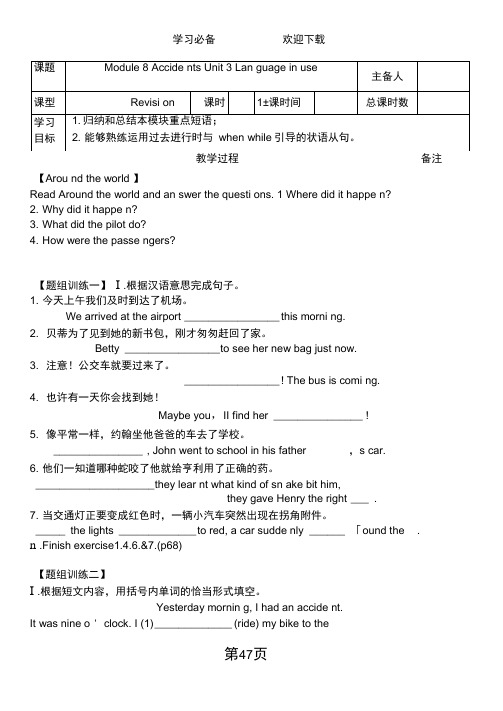
教学过程备注【Arou nd the world 】Read Around the world and an swer the questi ons. 1 Where did it happe n?2. Why did it happe n?3. What did the pilot do?4. How were the passe ngers?【题组训练一】I .根据汉语意思完成句子。
1. 今天上午我们及时到达了机场。
We arrived at the airport ________________ this morni ng.2. 贝蒂为了见到她的新书包,刚才匆匆赶回了家。
Betty ________________ t o see her new bag just now.3. 注意!公交车就要过来了。
________________ ! The bus is comi ng.4. 也许有一天你会找到她!Maybe you,II find her _______________ !5. 像平常一样,约翰坐他爸爸的车去了学校。
_______________ , John went to school in his father ,s car.6. 他们一知道哪种蛇咬了他就给亨利用了正确的药。
____________________ t hey lear nt what kind of sn ake bit him,they gave Henry the right ___ .7. 当交通灯正要变成红色时,一辆小汽车突然出现在拐角附件。
_____ the lights _____________ to red, a car sudde nly ______ 「ound the .n .Finish exercise1.4.6.&7.(p68)【题组训练二】I .根据短文内容,用括号内单词的恰当形式填空。
外研版-英语-八上-八上Module6 3单元 导学案:第二课时
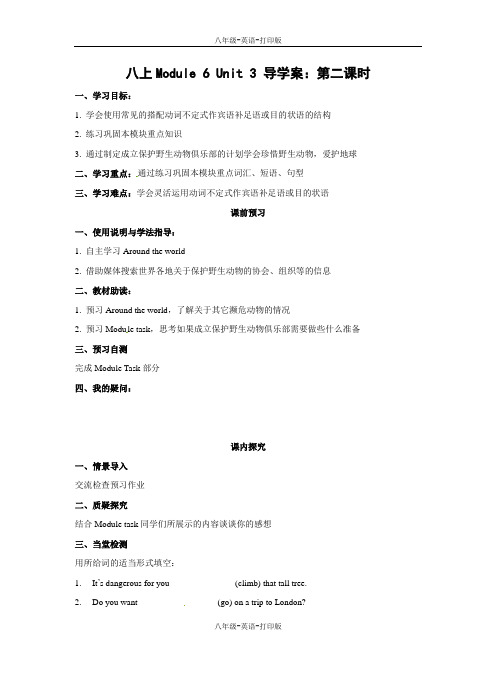
八上Module 6 Unit 3 导学案:第二课时一、学习目标:1. 学会使用常见的搭配动词不定式作宾语补足语或目的状语的结构2. 练习巩固本模块重点知识3. 通过制定成立保护野生动物俱乐部的计划学会珍惜野生动物,爱护地球二、学习重点:通过练习巩固本模块重点词汇、短语、句型三、学习难点:学会灵活运用动词不定式作宾语补足语或目的状语课前预习一、使用说明与学法指导:1. 自主学习Around the world2. 借助媒体搜索世界各地关于保护野生动物的协会、组织等的信息二、教材助读:1. 预习Around the world,了解关于其它濒危动物的情况2. 预习Modu le task,思考如果成立保护野生动物俱乐部需要做些什么准备三、预习自测完成Module Task部分四、我的疑问:_____________________________________________________________________________ _____________________________________________________________________________课内探究一、情景导入交流检查预习作业二、质疑探究结合Module task同学们所展示的内容谈谈你的感想三、当堂检测用所给词的适当形式填空:1.It’s dangerous for you ______________ (climb) that tall tree.2.Do you want _________________ (go) on a trip to London?3.I wish ___________________ (be) a college student.4.I don’t know where ____________________ (find) the lost key.5.He asked me ___________________ (talk) about English study.6.I have a lot of homework ___________________ (do).7.The teacher made him ___________________ (say) the word like this.8.Betty trained hard ___________________ (improve) his basketball skill.9.I’m sorry ___________________ (hear) that your grandma is ill.10.The teacher tells us _____________________ (not make) the water dirty.四、课后反思__________________________________________________________________________________________________________________________________________________________课后训练一、单项选择:( ) 1 . It is difficult _______ English well .A . learnB . to learnC .learns( ) 2 . No one can make you _________ .A . goB . to goC . going( ) 3 . Children need enough time ________ .A . sleepB . sleepingC . to sleep( ) 4 . What do you want __________ on Sunday morning .A . to seeB . seeingC . see( ) 5 . That’s very kind of you _______ me with my English .A . helpB . to helpC . helping( ) 6 . When did you finish _________ the book ?A . readB . readingC . to read( ) 7 . It’s great ___________ English freely .A . speakB . to speakC . speaking( ) 8 . We need ___________ harder than before .A . studyB . to studyC . studying( ) 9 . Mum always tell me ________ football in the street .A . to not palyB . to play notC . not to play二、阅读理解Now people are trying to ma ke the world a better place for birds to live in. People in China start the Bird Loving Week. Students from all parts of the country have been doing something to care for birds.Meng Yiru, a 16-year-old student from Nanyang Model HighSchool in Shanghai, asked people to protect birds: Never put birds incages. Go to visit them in the wild if you really love them. “I’ll neverforge t the little sparrow(麻雀)I kept in a cage,”said Meng. “Itstopped eating after I caught it and soon died.”Meng and her classmates put many of their ideas in their 300-word report to ask people to take better c are of birds.China is the home of more than 1,000 kinds of birds because the country is large and has almost every weather type to suit them.But not everyone knows how to take good care of them. Some cut down trees and destroy the birds’ homes. This has made the number of the birds go down quickly. A study shows that one out of eight birds, more than 1,200 kinds, in the world could die out. This includes 95 percent of albatrosses(信天翁)and 60 percent of cranes(鹤).Some birds you see every day, like pigeons and parrots, are also in danger!To help them, people have set up 7,500 reserves which are suitable and safe for the birds. In China, there are big reserves like the ones near the Dongting Lake in Hunan and the Poya ng Lake in Jiangxi. Is there anything that you can do for birds? Take care of their homes. Feed them with something delicious. Well, think it over and begin to do it now!1. China is the home of many kinds of birds because________.A. people in China love birdsB. people in China have planted a lot of treesC. people in China don’t eat birdsD. it is large and has almost every weather type to suit them2. Meng Yiru kept a sparrow______.A. for several monthsB. and soon it diedC. and then set it freeD. and then gave it to her classmate3. Some people cut down trees and________.A. it may make our environment betterB. they can plant more cropsC. it may kill the birdsD. they can build more reserves4. A study shows that ________ of the birds may die out.A. one eighthB. halfC.two thirdsD. thirty percent5. The underlined word “reserves”probably means“________”.A.自然保护区B.聚居地C.野生动物园D.养鸟场。
外研版八年级英语上册全册导学案【精品学案,重点推荐】

Module 1 How to learn EnglishUnit 1 Try not to translate every word学习目标:1. 掌握学习英语的正确方法。
2. 学会用英语来向别人征求或提供建议。
学习任务:第一部分知识要点一、词汇:写出下列英文单词并朗读翻译v. ___________ n. ___________ 改正;纠正v.________将…...配对v. ____________ 给……标号码v. ____________重复v. __________ 语法n. ____________ 语音;发音v.______________写作;文章v.___________ 标点符号n. ____________ 拼写n. ___________ 学期n. ___________ 建议n. ____________ 错误n._____________笔记本n. ___________ 其他adj.& adv. ___________ 收音机n ___________ 报纸n. ___________ 信息;口信n. ____________ 每个;各个pron. __________ 其他的;不同的pron. __________ 卓越的;极好的adj. ___________管弦乐队n. __________二、习语: 阅读课文,找出下列汉语的英文表达。
欢迎回来_____________ 给你一些建议________________写下;记下____________在课上____________ 在…旁边___________尽力不要做某事/试着不要做某事________________________互相_____________ 做…是一个好主意___________________非常感谢______________ 举行音乐会________________帮助某人做某事__________________ 还有什么吗?_______________ 三、功能表达:你能从第二页对话中找出至少5种提建议的表达吗?__________________________ (Translate : 你应该…)__________________________ (Translate : 为什么不…?)__________________________ (Translate : …是一个好主意)__________________________ (Translate : …怎么样?)__________________________ (Translate : 尽力去做…/尽力不要去做…)你曾经还学过哪些提建议的表达?______________________________________________________________________________第二部分阅读理解一、阅读课本第二页对话,回答下面的问题。
外研版八年级英语上册导学案A层全册-八N2
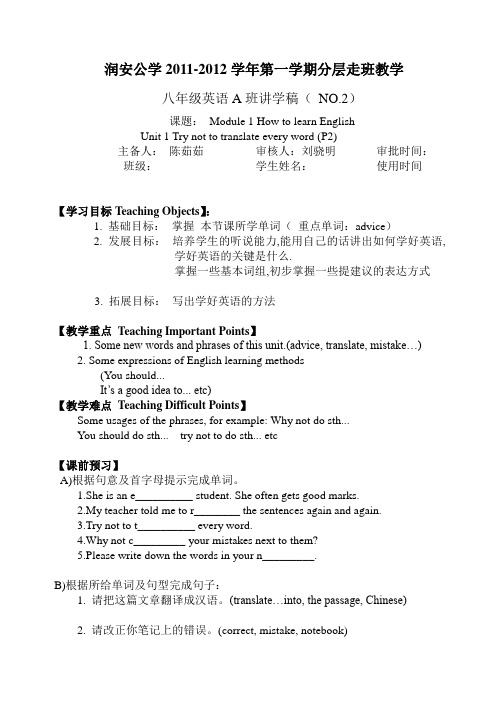
润安公学2011-2012学年第一学期分层走班教学八年级英语A班讲学稿(NO.2)课题:Module 1 How to learn EnglishUnit 1 Try not to translate every word (P2)主备人:陈茹茹审核人:刘骁明审批时间:班级:学生姓名:使用时间【学习目标Teaching Objects】:1. 基础目标:掌握本节课所学单词(重点单词:advice)2. 发展目标:培养学生的听说能力,能用自己的话讲出如何学好英语,学好英语的关键是什么.掌握一些基本词组,初步掌握一些提建议的表达方式3. 拓展目标:写出学好英语的方法【教学重点Teaching Important Points】1. Some new words and phrases of this unit.(advice, translate, mistake…)2. Some expressions of English learning methods(Y ou should...It’s a good idea to... etc)【教学难点Teaching Difficult Points】Some usages of the phrases, for example: Why not do sth...Y ou should do sth... try not to do sth... etc【课前预习】A)根据句意及首字母提示完成单词。
1.She is an e__________ student. She often gets good marks.2.My teacher told me to r________ the sentences again and again.3.Try not to t__________ every word.4.Why not c_________ your mistakes next to them?5.Please write down the words in your n_________.B)根据所给单词及句型完成句子:1. 请把这篇文章翻译成汉语。
最新外研版八年级英语上册教案全册
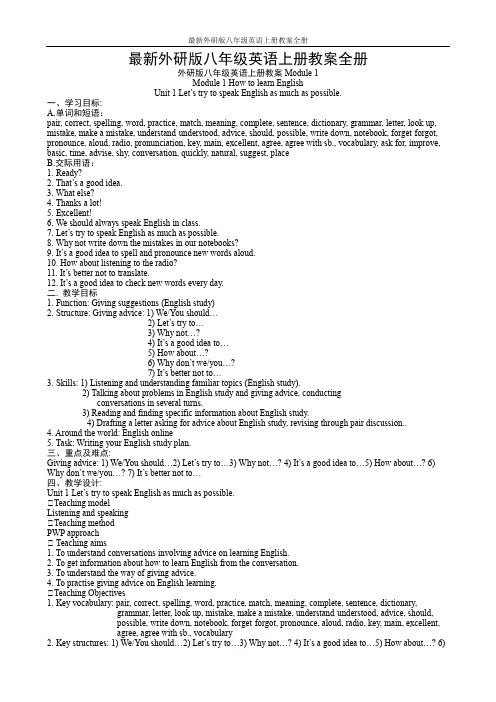
最新外研版八年级英语上册教案全册外研版八年级英语上册教案Module 1Module 1 How to learn EnglishUnit 1 Let’s try to speak English as much as possible.一、学习目标:A.单词和短语:pair, correct, spelling, word, practice, match, meaning, complete, sentence, dictionary, grammar, letter, look up, mistake, make a mistake, understand-understood, advice, should, possible, write down, notebook, forget-forgot, pronounce, aloud, radio, pronunciation, key, main, excellent, agree, agree with sb., vocabulary, ask for, improve, basic, time, advise, shy, conversation, quickly, natural, suggest, placeB.交际用语:1. Ready?2. That’s a good idea.3. What else?4. Thanks a lot!5. Excellent!6. We should always speak English in class.7. Let’s try to speak English as much as possible.8. Why not write down the mistakes in our notebooks?9. It’s a good idea to spell and pronounce new words aloud.10. How about listening to the radio?11. It’s better not to translate.12. It’s a good idea to check new words every day.二. 教学目标1. Function: Giving suggestions (English study)2. Structure: Giving advice: 1) We/You should…2) Let’s try to…3) Why not…?4) It’s a good idea to…5) How about…?6) Why don’t we/you…?7) It’s better not to…3. Skills: 1) Listening and understanding familiar topics (English study).2) Talking about problems in English study and giving advice, conductingconversations in several turns.3) Reading and finding specific information about English study.4) Drafting a letter asking for advice about English study, revising through pair discussion..4. Around the world: English online5. Task: Writing your English study plan.三、重点及难点:Giving advice: 1) We/You should…2) Let’s try to…3) Why not…? 4) It’s a good idea to…5) How about…? 6) Why don’t we/you…? 7) It’s better not to…四、教学设计:Unit 1 Let’s try to speak English as much as possible.ⅠTeaching modelListening and speakingⅠTeaching methodPWP approachⅠ Teaching aims1. To understand conversations involving advice on learning English.2. To get information about how to learn English from the conversation.3. To understand the way of giving advice.4. To practise giving advice on English learning.ⅠTeaching Objectives1. Key vocabulary: pair, correct, spelling, word, practice, match, meaning, complete, sentence, dictionary,grammar, letter, look up, mistake, make a mistake, understand-understood, advice, should,possible, write down, notebook, forget-forgot, pronounce, aloud, radio, key, main, excellent,agree, agree with sb., vocabulary2. Key structures: 1) We/You should…2) Let’s try to…3) Why not…? 4) It’s a good idea to…5) How about…? 6)Why don’t we/you…? 7) It’s better not to…ⅠTeaching aidsTape recorder, OHP , videoⅠTeaching StepsStep 1 Warming up1. Show some pictures of school things. Say how to learn English well.2. Read the words after the teacher.3. Introduce the new words.4. Learn the new words.Step 2 Read and check.1. Read the instructions in Activity 1and check(√) the ones you understand.1) Work in pairs. Ask and answer the questions.2) Correct the spelling.3) Listen and check the words you hear.4) Practise saying the words.5) Match the words with the meaning.6) Complete the sentences with the words in the box.3. Ask the students to check their answer with a partner.4. Call back the answer from the whole class and check the answer.Step 3 Listen and repeat.1. Ask the students to read the word and expressions in Activity2.dictionary grammar letter look up make a mistake meaning understand 2. Read through the questions.1) Which word did Daming not understand?2) What mistake did Lingling make?3) How does Daming usually check the spelling of a word?4) Why is it difficult for Daming to check the spelling of cinema?3. Play the recording and ask the students to listen to the recording carefully.4. Listen and answer the questions. Use the words and expressions from the box.5. Play the recording again, then they can check their answer with a partner.6. Call back the answer from the whole class and check the answer.Step 4 Listen and read.1. Show some pictures, and ask the students to talk about them.2. Ask the students to read the conversation silently.3. Play the recording and ask the students to listen and read the conversation.4. Read the conversation.5. Act it out.6. Learn “Everyday English”Ready?That’s a good idea.What else?Thanks a lot!Excellent!7. Tell the students how to learn English well.1) We should always speak English in class.2) Let’s try to speak English as much as possible.3) Why not write down the mistakes in our notebooks?4) Don’t forget to write down the correct answers next to the mistakes.5) It’s a good idea to spell and pronounce new words aloud every day.6) How about listening to the radio?7) How about reading English stories?8) Why don’t we try to find some English pen friends?Step 5 Writing.1. Read the conversation again.2. Ask the students to write notes about learning English.Listening : listen to the radioSpeaking : ___________________________________________________ Reading : ____________________________________________________ Writing: ____________________________________________________ Learning new words: ___________________________________________3. Ask the students to check with a partner.4. Check the answers:Keys:Listening : listen to the radioSpeaking : speak English as much as possibleReading : read an English storiesWriting: write to pen friends, write down our mistakes in our notebooks, write down the correct answers next to the mistakesLearning new words: spell and pronounce new words aloud every dayStep 6 Underline the correct words and expressions.1. Ask the students to read through the passage in Activity 4.Here’s my (1) advice / notebook about learning English. Speak English (2) always / as much as possible in class, and listen to English (3) in the newspaper / on the radio. I (4) agree / forget it’s a good idea to look up new worlds in the ( 5) notebook / dictionary. You can find the (6) correct / excellent pronunciation and learn the meaning2. Underline the correct words and expressions.3. Check with a partner.4. Call back the answers from the whole class.Keys: 1. advice 2. as much as possible 3. on the radio 4. agree 5. dictionary 6. correct 5. Read the passage together.Step 7 Listen and repeat.1. Play the recording once without stopping.2. Play the recording again and ask the whole class to repeat.1) We should always speak English in class.2) Let’s try to speak English as much as possible.3) Why not write down the mistakes in our notebooks?4) It’s a good idea to spell and pronounce new words aloud.5) How about listening to the radio?3. Ask the students to listen and mark the intonation.4. Now listen again and repeat.Step 8 Work in pairs.1. Talk about problems and give advice.Problems AdviceI can’t… How / What about …?I don’t know… Why not / don’t you …?2. Read through the example with the class.—I can’t speak English well. What should I do?—Why don’t you try to talk to our classmates in English?3. Work in pairs.Step 9 Important and difficult points1 Why not write down our mistakes in our notebooks?何不在笔记本上把我们的错误记下来?Why not …? 用来表示提出某种建议,而不是询问为什么不做某事的原因,例如:Why not take a walk in the park ?何不在公园里散散步?我们还可以用下面的表达方式来提建议:Why don’t we drive to the country?我们何不开车去乡下?What / How about going to Europe for a holiday?去欧洲度假怎么样?Write down 或者put down 表示“记下,写下”。
外研版八年级英语上册导学案A层全册-八N18
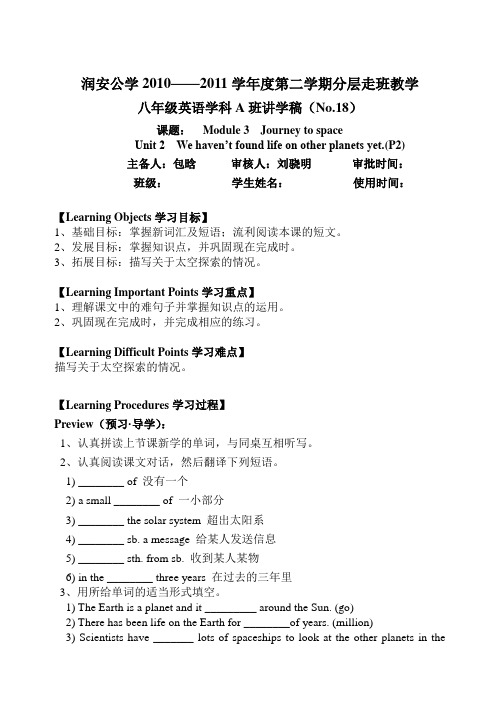
润安公学2010——2011学年度第二学期分层走班教学八年级英语学科A班讲学稿(No.18)课题:Module 3 Journey to spaceUnit 2 We haven’t found life on other planets yet.(P2)主备人:包晗审核人:刘骁明审批时间:班级:学生姓名:使用时间:【Learning Objects学习目标】1、基础目标:掌握新词汇及短语;流利阅读本课的短文。
2、发展目标:掌握知识点,并巩固现在完成时。
3、拓展目标:描写关于太空探索的情况。
【Learning Important Points学习重点】1、理解课文中的难句子并掌握知识点的运用。
2、巩固现在完成时,并完成相应的练习。
【Learning Difficult Points学习难点】描写关于太空探索的情况。
【Learning Procedures学习过程】Preview(预习·导学):1、认真拼读上节课新学的单词,与同桌互相听写。
2、认真阅读课文对话,然后翻译下列短语。
1) ________ of 没有一个2) a small ________ of 一小部分3) ________ the solar system 超出太阳系4) ________ sb. a message 给某人发送信息5) ________ sth. from sb. 收到某人某物6) in the ________ three years 在过去的三年里3、用所给单词的适当形式填空。
1) The Earth is a planet and it _________ around the Sun. (go)2) There has been life on the Earth for ________of years. (million)3) Scientists have _______ lots of spaceships to look at the other planets in thesolar system. (send)4) Up to now, we haven’t _________any life on other plane ts. (find)5) It is hard ____________ how large the universe is. (understand).【Class Activities 课堂活动】Step1 Feedback on the preview1、讨论解决预习中存在的问题(师生互问探讨)。
外研版八年级英语上册导学案A层全册-八N13
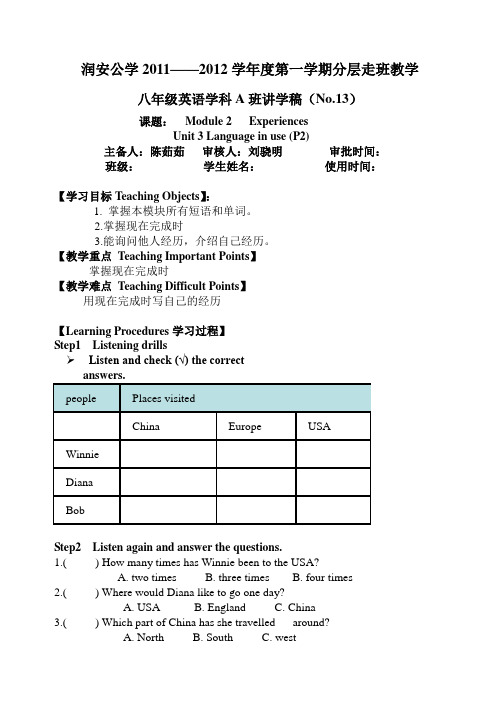
润安公学2011——2012学年度第一学期分层走班教学八年级英语学科A班讲学稿(No.13)课题:Module 2 ExperiencesUnit 3 Language in use (P2)主备人:陈茹茹审核人:刘骁明审批时间:班级:学生姓名:使用时间:【学习目标Teaching Objects】:1. 掌握本模块所有短语和单词。
2.掌握现在完成时3.能询问他人经历,介绍自己经历。
【教学重点Teaching Important Points】掌握现在完成时【教学难点Teaching Difficult Points】用现在完成时写自己的经历【Learning Procedures学习过程】Step1 Listening drillsListen and check (√) the correctStep2 Listen again and answer the questions.1.( ) How many times has Winnie been to the USA?A. two timesB. three times B. four times2.( ) Where would Diana like to go one day?A. USAB. EnglandC. China3.( ) Which part of China has she travelled around?A. NorthB. SouthC. west4.( ) How did she travel there?A. by boatB. by trainC. by plane5.( ) Has Bob ever visited China?A. No, he hasn’tB. Yes, he hasStep3 Work in groups. Ask and answer the questions.1. has been to LondonA: Have you ever been to London?B: Yes, I have.C: Has B ever been to London?A: Yes, he / she has.2.hasn’t ever tried skiing3. has written an email in English4. hasn’t ever had an English pen friend5. hasn’t taken a plane6. has been to another city by trainStep4 Do avtivity 9(见课件)Step5 Write a short passage about one of your fantastic experiences. You may choose one topic from the above discussion, such as sport, book, film, food, technology, etc. You should tell us WHAT, WHERE, WHEN, HOW, WHY and HOW you do it. You may begin like this:I have had a fantastic experience. This afternoon, when I was on my way home …. Step5 Exercises.I 单选题1.He _________ taught here for 5 years.A. hasB. haveC. was2. It sounds ________ , let’s do it.A. wellB. goodC. bad3.We have visited Qingdao ________________.A. two months agoB. beforeC. now4. Betty has ___ entered a competition, she wants to do it.A. everB. neverC. just5. Have you wanted to go to the USA ? ____________A. Yes, I do.B. Yes, I have.C. No, I hasn’t.6. The second ______ is two beautiful watches.A. priceB. prizeC. place7. What’s the ______ of a train ticket to Shenzhen ?A. priceB. prizeC. placeII现在完成时翻译下面句子。
外研版-英语-八上-Module6 3单元 导学案

Module 6 A famous story 一、学习目标1.能够描述过去正在进行的动作。
2.能够正确使用过去进行时。
3.了解西方文化,培养爱国感情。
类别课程标准要求完成的内容必备单词名词:rabbit, hole, daisy, chain, field,storm, noon, bookshop, gold,ring,hall动词:fall, carry, jump, scream, wear, clap, cheer, perform, follow, stop形容词:strange, tired, pink 副词:suddenly, once, outside介词:across, under, during常考短语go off, go on, in a tree, have nothing to do, think of, feel tired经典句型How is it going, Lingling?One day she was sitting by the river with a book, but s he wasn’t reading it.—What were you doing at 7 am yesterday?—I was going to school.重点语法过去进行时的用法四、教材精华Unit 3 Language in use第3单元语言应用1.There was a big storm outside.外面下起了暴雨。
outside是副词,意为“在外面”。
The boys were playing outside.(那时)男孩们正在外面玩。
拓展outside也可用作介词,意为“在……外”。
Some people are waiting outside the room.一些人在房间外面等侯。
inside adv.在里面;prep.在……里面st Sunday,during the day…上周日,白天……during作为介词,意为“在……期间”。
外研版八年级英语上册导学案Module8
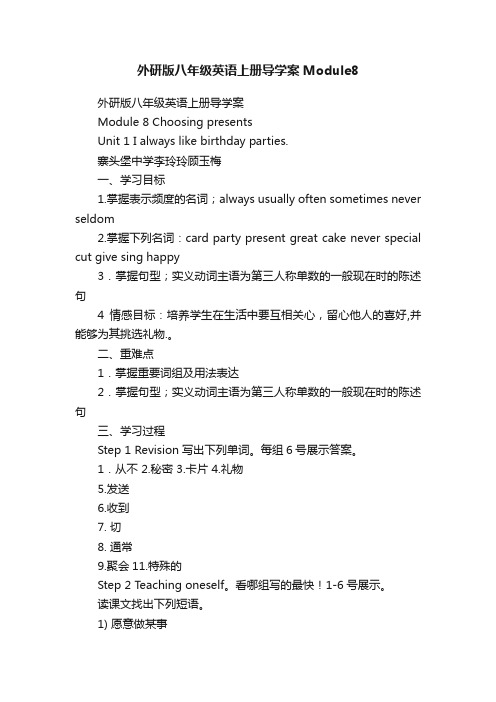
外研版八年级英语上册导学案Module8外研版八年级英语上册导学案Module 8 Choosing presentsUnit 1 I always like birthday parties.寨头堡中学李玲玲顾玉梅一、学习目标1.掌握表示频度的名词;always usually often sometimes never seldom2.掌握下列名词:card party present great cake never special cut give sing happy3.掌握句型;实义动词主语为第三人称单数的一般现在时的陈述句4情感目标:培养学生在生活中要互相关心,留心他人的喜好,并能够为其挑选礼物.。
二、重难点1.掌握重要词组及用法表达2.掌握句型;实义动词主语为第三人称单数的一般现在时的陈述句三、学习过程Step 1 Revision写出下列单词。
每组6号展示答案。
1.从不 2.秘密 3.卡片 4.礼物5.发送6.收到7. 切8. 通常9.聚会11.特殊的Step 2 Teaching oneself。
看哪组写的最快!1-6号展示。
读课文找出下列短语。
1) 愿意做某事2) 在中国的生日宴会上3) 做生日蛋糕4) sing Happy Birthday 5) get birthday presents6) buy a special present 7) 用英语唱8) 吃面条9) 把某物给某人Step3Teamwork 完成Act3,4, (5、6)号要努力展示自己啊!Step4 再读课文找出疑难句子组内讨论解决Step 5 语言点一、频度副词(一)频率副词是表示与次数,频率有关的副词,如:always(总是), usually(通常), often (经常)sometimes(有时), seldom(不常), hardly10%(几乎不) hardly ever(几乎从不) never(从不)once(一次), twice(两次)等。
外研版初二英语上册导学案A层 八N20

润安公学——第二学期分层走班教学八年级(上)Module 3综合能力测试(No.20)(满分:100)得分:________________ 班级:学生姓名:使用时间:Ⅰ. 单项选择(15分)从A、B、C、D四个选项中,选择一个能填入句中空白处的最佳答案。
( ) 1. I was ____ happy on hearing the good news that I couldn’t even fall asleep.A. tooB. soC. suchD. much( ) 2. I hope I can ____ the moon by spacecraft one day.A. getB. reachC. arriveD. get in( ) 3. As we know, there are ____ stars in our galaxy.A. 200 billionB. 200 billionsC. 200 billions ofD. billion of ( ) 4. They left for Beijing last week and we ____ them so far.A. don’t hear fromB. didn’t hear fromC. haven’t heard fromD. won’t hear from( ) 5. I don’t think Rose works ____ Mary.A. as hard asB. as harder asC. as hardest asD. hard than ( ) 6. The two astronauts have ____ returned from the space station.A. justB. just nowC. yetD. still( ) 7. I must return the camera to Li Lei. I ____ it for two days.A. keepB. borrowedC. have keptD. have lent( ) 8. All the workers were very tired, but ____ of them would take a rest.A. allB. neitherC. anyD. none( ) 9. ---____ do you help our mother do the housework?---Once a week.A. How oftenB. How longC. How soonD. How much ( ) 10. ____ Earth turns around ____ Sun.A. An; aB. A; aC. The; theD. The; a( ) 11. What languages use the names of the planets ____ the days of the week?A. ofB. aboutC. forD. with( ) 12. He asked me ____ it secret.A. keepingB. to keepC. keptD. keeps( ) 13. I live ____ in a ____ village.A. alone; aloneB. lonely; lonelyC. alone; lonelyD. lonely;alone( ) 14. ---Excuse me, look at the sign NO PARKING.---Sorry, I ____ it.A. don’t seeB. won’t seeC. haven’t seeD. didn’t see ( ) 15. ---Have you finished your work____?---Yes, I have. I’ve ____ finished it.A. yet; alreadyB. already; yetC. just; alreadyD. just; yetⅡ. 完形填空(10分)先通读下列短文,掌握其大意,然后从每题所给的四个选项中选择最佳答案填空。
外研社初中英语八年级上册Module 8 Unit 3 Language in use导学案

外研社初中英语重点知识精选掌握知识点,多做练习题,基础知识很重要!外研社版初中英语和你一起共同进步学业有成!Module 8 AccidentsUnit 3 Language in use学习目标1、会读并应用本课的新词汇和短语2、巩固运用本模块第一、二两单元的重点词汇和句型。
3、熟练掌握过去进行时when,while,as的用法并灵活应用。
学习重点:本模块的重点词汇和句型。
学习难点:过去进行时的用法。
使用说明与学法指导:1.尝试总结知识结构。
2. 完成时间30分钟。
教材助读:情景导学资料课前预习对照音标(P185,TB,大声朗读一下词汇和短语。
大声朗读句型,熟读每篇课文。
预习自测:写出下面的词组1. 降落2. 大量的3. 不得不4. 迅速作出决定5. 肩并肩6. 沉睡,睡着7,像平常一样 8. 注意9. 伤了某人的膝盖 10. 在痛苦中;痛苦地课内探究预习情况检查。
小组内核对答案. 核对68-70页答案质疑探究一、本模块重点短语:1. 在拐弯处 round the corner2. 打电话聊天 talk on the phone3. 及时 in time 按时 on time4. 从自行车上摔下来 fall off a bike5. 注意 pay attention (to…)6. 并排地 side by side7. 骑自行车 ride a bike 8. 过马路cross the road9. 高兴做某事be glad to do soth. 10. 撞了一个男孩 hit a boy11. 拿起;拣起 pick up 12. 拾起,捡起 pick up13. 能够 be able to 14. 发送某物给某人send sth. to sb.15. 讲故事tell a story 16. 为……做好准备get ready for …17. 第二天 the next day 18. 给某人看某物show sb. sth. 19. 变得更糟get worse 20. 几个,一些 a few 几天前 a few days earlier21. 最后in the end / at last 22. 很痛苦地 in great pain23. 像往常一样as usual 24. 为了,以便so that / in order that 25. 带某人到某地take sb. to sp. 26. 在将来 in the future27. 给……拍照 take a photo of照相 take a photo / take photos28.在从学校回家的路上 on the way home from school 29. 发生事故 have an accident二、本模块语法过去进行时when,while,as的用法区别当堂检测:一、完成句子1. 他们那时不在打排球They________ ________ volleyball at that time.2. 正当他们在说话的时候,老师进来了While they________ ________, the teacher came in .3.昨晚从8点到10点他一直在画画。
【八年级】初二英语上册A层导学案(外研版)
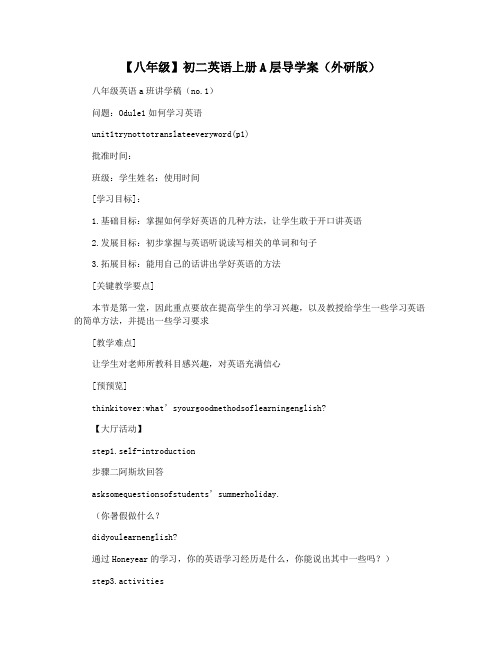
【八年级】初二英语上册A层导学案(外研版)八年级英语a班讲学稿(no.1)问题:Odule1如何学习英语unit1trynottotranslateeveryword(p1)批准时间:班级:学生姓名:使用时间[学习目标]:1.基础目标:掌握如何学好英语的几种方法,让学生敢于开口讲英语2.发展目标:初步掌握与英语听说读写相关的单词和句子3.拓展目标:能用自己的话讲出学好英语的方法[关键教学要点]本节是第一堂,因此重点要放在提高学生的学习兴趣,以及教授给学生一些学习英语的简单方法,并提出一些学习要求[教学难点]让学生对老师所教科目感兴趣,对英语充满信心[预预览]thinkitover:what’syourgoodmethodsoflearningenglish?【大厅活动】step1.self-introduction步骤二阿斯坎回答asksomequestionsofstudents’summerholiday.(你暑假做什么?didyoulearnenglish?通过Honeyear的学习,你的英语学习经历是什么,你能说出其中一些吗?)step3.activities学习难点:_____________________________________________________________________________________________________________________________howtosolvethem?________________________________________________ _________________________________________________step4:conclusion学习的重要性(一些例子)howtolearnenglish?第五步:查看如何学习英语。
step6:learningsomeneords.[法庭反馈]回想本节所学内容,你学到了哪些?你还有什么疑问?【教师反思】。
- 1、下载文档前请自行甄别文档内容的完整性,平台不提供额外的编辑、内容补充、找答案等附加服务。
- 2、"仅部分预览"的文档,不可在线预览部分如存在完整性等问题,可反馈申请退款(可完整预览的文档不适用该条件!)。
- 3、如文档侵犯您的权益,请联系客服反馈,我们会尽快为您处理(人工客服工作时间:9:00-18:30)。
润安公学2011—2012学年度第一学期分层走班教学八年级英语学科A层讲学稿(No. 63)课题:Module 11 The weatherUnit 2 When’s the best time to visit your own town or country.(2课时)主备人:陈茹茹审核人:刘骁明审批时间:2011.12.27班级:学生姓名:使用时间:【Learning Objects学习目标】1、知识目标:(1)会读、会写本课的新词汇和短语camera, umbrella, pleasant, from, time to time, fall, compared to,能理解并熟练地朗读本课的短文。
(2)了解去美国不同地方旅行的最佳时间及原因。
2、能力目标:(1)能够掌握并应用本课出现重点的新单词和短语造句。
(2)给别人提出建议时,学习使用because, so 和but。
(3)掌握may,might的用法;找出本课中的不定式,并指出它们的语法功能。
3、情感目标:了解家乡的气候状况,给别人提出旅行的建议,懂得关心他人。
4、学习策略:利用关于天气及气候变化的一些幻灯片等音像资料丰富自己的学习。
5、文化意识:了解美国的一些气候特点。
【Learning Important Points学习重点】重点句型:When’s the best time to visit your town or country?It’s a good idea to bring your camera.It’s pleasant to visit Alaska in July.It’ll be dark all day and freez ing cold.There are storms from time to time in summer and fall. 【Learning Difficult Points学习难点】学习使用because, so 和but表述原因;【Learning Procedures学习过程】Preview(预习·导学):1、预习课本187-188页标有(90)的单词,对照音标试着拼读并掌握拼写和中文意思。
2、预习课文内容,翻译下列句子:(1). 也许你想四处走一走,因此要带上一份好地图。
(2). 你可能要拍几张秋天树叶的照片,所以带上你的相机是个不错的主意。
(3). 西部并不十分寒冷,但雨水多,所以要带伞。
(4). 和许多其他地方相比,那里常常骄阳似火。
(5). 这里的夏天和秋天常有暴雨。
【Class Activities 课堂活动】Step1 Feedback on the preview讨论解决预习中存在的问题(师生互问探讨)。
Step2 Key vocabulary1. Read the new words after the teacher, then read together, try to know themeaning of these words in class.2. Have a dictation about the key words.Step3 Listening and readingStep5. Do Activity 2.Step6. Writing1. Finish Activity 4.2. Write some advice for visiting my town and give some reasons. Use because,so and but.Step7. 归纳表述建议和原因的重点句型。
Step7. ExercisesⅠ. 根据所给首写字母提示,写出空缺处单词正确形式。
1. This is a p_______ trip and we have a very great time.2. Do you have a c_____ __ ?3. The colorful u_______ are beautiful.4. She likes to lie on the grassland on s_______ days.5. Americans call “autumn” f_______.Ⅱ. 单项选择。
( )1. We'd better visit New Y ork in May or October it’s not too hot th en.A. soB. butC. andD. because( )2. In Los Angeles and California the weather is fine .Y ou can see the sun in winter and swim in the sea.A. in springB. in summerC. all yearD. all night ( )3. When we travel. We should bring a good map because we want to travel around the city.A. needB. canC. mayD. must ( )4. Wear some clothes when you climb mountains. It’s cold at the top of them.A. lightB. warmC. beautifulD. simple ( )5. The weather starts to get in fall in Dalian.A. coolerB. warmerC. longerD. darker ( )6. I looked at my watch to make sure I'm not late for my dateA. from time to timeB. in timeC. at the same timeD. on time( )7. Look at the clouds. What a __________ day today!A. cloudyB. cloudC. freezingD. rainy( )8. ----Where is your uncle?---- I don’t know. He __________ at home.A. may beB. maybeC. must beD. must( )9. He ____ get up early this morning.A. to needB. needs toC. need toD. needs( )10. I like skiing _____ I think it’s a little dangerous .A. andB. becauseC. soD. butⅢ. 根据汉语意思完成句子。
1. 我想去海南旅游的最佳时间是在十一月。
_____________________________to Hainan Island is in November , I think.2. 气预报说下星期可能刮风。
The weather forecast says it ________________________ next week.3. 这里的天气变化很快,所以你要带上大衣。
Bring a coat the weather .4. 去那里度过我们的假期能有可能吗?___________________________________ go there for our holiday?5. 小女孩星期天有时会帮忙做家务。
The little girl helps with the housework_________________ on Sunday.6. 和其它科相比,英语是有趣的。
___________________ other objects, English is more interesting.7. 春天这里经常下雨,所以带上伞是个好主意。
It often in spring . I t’s an umbrella. Ⅳ. 选择合适的词完成句子。
1. He __ _(can’t, may not) be tired. He has just begun to work.2. The man __ _(might, probably) be Mary’s husband.3. They _ __(possible, may) go climbing in the Alps next summer.4. It is _ __(probably, possible) for us to get from Beijing to Tianjin in an hour.5. I like animals. __ _ (Maybe, May be) I’ll keep a pet cat one day.Step10. Homework.1. Revise the key words and expressions and recite them.2. Revise the language points.3. Read the passage and finish the exercises in the workbook (Activities 4, 6, 10) 【学生自查】(本节课不懂之处)【教学反思】。
